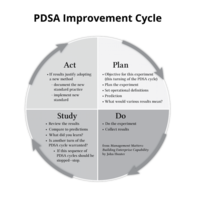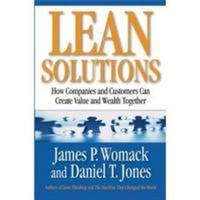Blog posts on lean managementPosts selected fromManagement Blog - Engineering Blog - Investing Blog and other blogs - Early "Lean" Thinking
Here are some early reports (so early it preceded the lean terms widespread use). It also means the focus hasn't already been set by the Machine that Changed the World but it is the same stuff that those that studied in 1980, 1990, 2000 or 2013 saw - it is more about respect for people and using everyone's brain than any specific tool. And these articles have a bit more focus on using statistics and data than much of lean literature today (partially because George Box and Dad were statisticians and partially, in my opinion, because current lean literature is light on using data). continue reading: Early "Lean" Thinking - Lean v Innovation is a False Dichotomy
The whole idea that process improvement efforts are harmful to innovation frustrates me. It is due to misunderstanding what is labeled as process improvement. Lean isn't about just making whatever process exists less wasteful. Lean focuses on value added to customers but people forget that.
...
Yes a think tank or research lab would not be served well by the same types of processes as a fast food restaurant. And a fast food restaurant wouldn't be served by the type of process improvement that would benefits a research lab. continue reading: Lean v Innovation is a False Dichotomy - Agile Software Development and Deming's Ideas
- What is a Lean Program, Deming Program?
Lean has evolved away, IMO, from just being able to say anything Toyota does is by definition lean. Lean and Deming are more about a philosophy of managing - continual improvement, respect for people, etc. than prescriptions. So you can't really have a checklist and say that if your org can check off all these things they are lean or Deming.
The fact that the management systems can't be reduced to a checklist is a necessary given the long lasting power they offer. continue reading: What is a Lean Program, Deming Program? - Robots for Health Care from Toyota
Most often innovation efforts take the form of understanding the jobs your customers are using your products and service for now and developing new solutions to delight those customers. This is difficult for companies to pull of successfully.
Occasionally innovation involves meeting completely new needs of customers. For example Toyota started as a loom company and is now known as a car company. Making such a radical change is not often successful.
Will Toyota be able to add robots to the products it produces successfully? I believe they have a chance. But it won’t be easy. continue reading: Robots for Health Care from Toyota - Improving Management with Tools and Knowledge
 Both the tools and the underlying principles are catalysts to better management. Alone each can result in a bit of improvement. But when they are used together is when you see remarkable improvement. The effective integration of the principles and the tools is what separates the remarkable companies we respect (and maybe envy) from all the others that are having some success but that are also struggling in many ways. continue reading: Improving Management with Tools and Knowledge - Toyota as Homebuilder
many organizations don’t apply many concepts that have been proven effective for decades. So I hope Toyota gets into any business that continues to provide lousy value to the consumer (at least those where that consumer is me). I wish they would create their own credit card (they offer Toyota branded Visa and MasterCard credit cards now, in Japan), provide high speed internet service and run an airline.
Toyota is probably too smart to try and run an airline in the US (only Southwest seems to be able to that profitably).
...
On the Toyota web site they list the following areas of non-automotive Toyota business: financial services, information and communications, marine and most surprisingly Biotechnology and Afforestation. Toyota states: “Biotechnology may seem far removed from the auto industry. It is, however, closely related to automaking in the context that they are both aiming to achieve a sustainable society, and their close relationship can be seen in the new Raum, launched in May 2003, which uses parts made from bioplastics.” continue reading: Toyota as Homebuilder - Could Toyota Fix GM
Yes, Toyota could fix GM. Even the right leaders and managers, within GM, could fix GM but it is a huge long term job and it would be harder to do it internally because you will have to do it while competing with Toyota. Also they have some difficult issues to deal with since their previous managers did not tihnk of the long term (20-50 years out from the decisions they were making in the 70s though 90s).
I wouldn’t buy GM if I were Toyota, though. Why bother. Just grow Toyota, it is working very well so far. It makes sense to buy if you need to grow quickly to gain critical mass, or you will lose the opportunity to grow early in a fast moving market. High tech companies (like Cisco and Intel) often do well buying other companies – but just as often high tech companies make more mistakes buying than is justified by the successes. continue reading: Could Toyota Fix GM - New Toyota CEO’s Views (2005)
Toyota has grown in the past few years, but [there’s a risk] that a belief that the current status is satisfactory creeps into the minds of employees. That’s what I’m worried about.
We should never be satisfied with the current status. In each division, function, or region, we still have numerous problems to cope with. We need to identify each one of those tasks or problems and fully recognize them and pursue the causes. This needs to be done by all the people working for Toyota.
continue reading: New Toyota CEO’s Views (2005) - Jeff Bezos on Lean Thinking (2005)
I read a book recently about Toyota’s lean production methodology, which is very interesting
continue reading: Jeff Bezos on Lean Thinking (2005) - How Toyota Turns Workers Into Problem Solvers
This idea is simple. Creating an environment where this is actual the way things are, not just the way things are said to be, is difficult. That is why I believe so strongly in Deming’s management philosophy. The organization must be viewed as a whole. Benefits can be gained by adopting some concepts in a piecemeal manner. However, many benefits accrue only when the positive interactions between Toyota Production System (TPS – Lean) concepts occur (as systems thinking would predict). continue reading: How Toyota Turns Workers Into Problem Solvers - The Dramatic Spread of Lean Thinking
Life indeed will be better for all of us with the improvement of management. The benefits of economic success are large. Good jobs are desired everywhere: USA, India, Germany, Singapore… Those jobs provide positive externalities that create a reinforcing loop of improving conditions.
There are many important factors (education, investment, political stability, rule of law…) to economic success. Effective management is among the factors that can provide dramatic increases in the standard of living of a country or community. continue reading: The Dramatic Spread of Lean Thinking - Lean Government
I was one of the founding board members on the ASQ Public Sector Network (now the ASQ Government Division). I also, created and have maintained the Public Sector Continuous Improvement web site for a decade (some additional details on my background).
There have been many great efforts in the government, but still so much more needs to be done.
Here are articles exploring what has been done:
continue reading: Lean Government - More Lean Thinking Applied in Government (2005)
Tinker Air Force Base, Oklahoma City Air Logistics Center:
the Tanker Division utilized an array of process improvement tools to facilitate improvements while increasing quality, efficiency and safety; thus enabling them to become the benchmark effort in lean implementation for Tinker Air Force Base. The results were dramatic: within four years, the average yearly flow time for a KC-135 PDM dropped 52%, the number of aircraft on station (WIP) decreased 49%, and capacity increased 75%. continue reading: More Lean Thinking Applied in Government (2005) - Lean Consumption: the Customer’s Perspective
 The concepts underlying lean consumption boil down to six simple principles that correspond closely with those of lean production.
- Solve the customer’s problem completely by making sure that all the goods and services work together to do so.
- Don’t waste the customer’s (or the provider’s) time.
- Provide exactly what the customer wants.
- ...
continue reading: Lean Consumption: the Customer’s Perspective
|